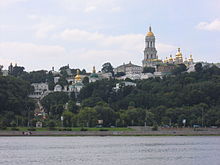Ukrainian Orthodox Church (Moscow Patriarchy)
| Ukrainian Orthodox Church | |
|---|---|

The 11th century Kiev Pechersk Lavra in Kiev
|
|
| Founded | 1685 (autonomy); 1770 (autonomy stripped); 1921 (exarchate); 1990 (self-rule) |
| Founder | Gedeon (united with the Russian Orthodox Church) |
| Recognition | 1990 |
| Supreme Governor | Patriarch Kirill |
| Primate | Metropolitan Onuphrius |
| Polity | Russian Orthodox Church |
| Headquarters |
Refectory Church (Kiev Cave Monastery) Cathedral of the Resurrection of Christ(being built since 2007) |
| Territory | Ukraine |
| Language | Church Slavonic, Ukrainian, Romanian |
| Members | 17.4% of religious population (by Razumkov Center, January 2015) 20.85 of religious population (by Ukrainian Sociology Service and Kucheriv democratic initiatives fund, December 2014 – January 2015) |
| Bishops | 85 (53 governing) |
| Priests | 11,312 |
| Parishes | 12,069 |
| Monastics | 4,412 |
| Monasteries | 251 |
| Nuns | 2,727 |
| Website | Ukrainian Orthodox Church |
The Ukrainian Orthodox Church (UOC; Ukrainian: Українська Православна Церква, translit. Ukrayinsʹka Pravoslavna Tserkva, Russian: Украинская Православная Церковь, translit. Ukrainskaya Pravoslavnaya Tserkov') is a self-governing church of the Russian Orthodox Church in Ukraine. The current Statute of the ROC defines it as a "self-governing church with the rights of wide autonomy". Officially such status has no recognition outside of the Russian Orthodox Church.
Russia's annexation of Crimea in 2014 notwithstanding, the UOC eparchies in Crimea continue under the administration of the UOC. While being a part of the Moscow Patriarchate, the current status of the UOC means its virtually full administrative independence from the ROC Holy Synod, whereas the UOC Primate is the seniormost permanent member thereof and thus has a say in the decision-making in respect of the rest of the ROC, including its business in the Russian Federation.
The Ukrainian Orthodox Church considers itself the sole descendant in modern Ukraine of the Ruthenian (Kyivan) metropolis within the jurisdiction of the Ecumenical Patriarchate of Constantinople established in Kiev in the 10th century. Due to invasion of the Mongols in the 13th century the metropolitan seat was moved to Vladimir and later to Moscow, while in the Duchy of Halych and Volhynia was created a separate Metropolis of Halych with own Metropolitan. In the 14th century the Grand Duke of Lithuania Algirdas who established his control over the former territories of Kievan Rus attempted to move the metropolitan seat back to Kiev.
...
Wikipedia
